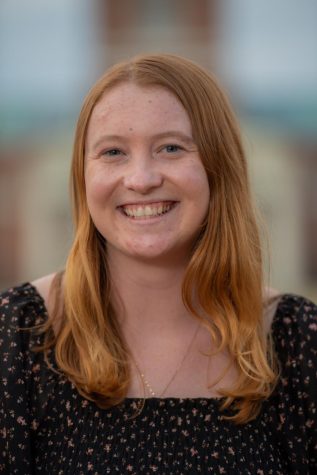Panhellenic votes to hold the remainder of recruitment online
The news was met with mixed emotion from those going through the recruitment process
Most Panhellenic sororites continue to appropriate hand signs.
January 9, 2022
The third and fourth rounds of Panhellenic recruitment have switched to an online modality.
Both events, taking place on Jan. 9 and Jan. 15, respectively, were originally scheduled to take place in person on campus. Now, they have been moved online due to concerns surrounding COVID-19 and a potential rise in cases due to the new Omicron variant.
“Over the past semester as a Panhellenic recruitment team, we have been consistently talking to university officials as well as chapters to discuss modalities for this week in regards to overall safety,” Wake Forest Panhellenic Council President Emily Conway said. “The decision to transition preference night to online was unanimously made by all eight chapters as well as the Panhellenic recruitment team. We wanted this process to be the most beneficial for potential new members and to lower the risk of infection for the entire Wake Forest community.”
Potential new members (PNMs) completed the first two rounds of recruitment from their homes via Zoom. Now, they will do the same for the next two rounds, except this time from their living spaces on campus.
The third round of recruitment is “Sisterhood Day” and the fourth round is “Preference Night”. Preference Night is the last round of recruitment in which PNMs rank their preferred order of sororities for which they are still eligible, and in return, the sororities also select the PNMs in whom they are most interested. PNMs are worried that an online modality will affect the experience of Preference Night and the rest of the recruitment process as a whole.
The decision to transition preference night to online was unanimously made by all eight chapters as well as the Panhellenic recruitment team. We wanted this process to be the most beneficial for potential new members and to lower the risk of infection for the entire Wake Forest community — Panhellenic President Emily Conway
“Online rush is hard because it is difficult to learn a person’s body language and personality through a little box on a screen,” freshman Mercer Webb said. “Many PNMs were looking forward to finally seeing how sorority sisters interact with each other, because, of course, you don’t get to see that over Zoom.”
Elise English, also a freshman, echoed Webb’s sentiments. English said her virtual experience for the first two rounds was pleasant, however, nothing can replace the authenticity and excitement of meeting sisters in person.
“I think the excitement of the last few rounds may be dimmed because they are online,” English said. “It also might be hard to get a sense of what each sorority is really like because it’s all over Zoom.”
With in-person classes, club meetings and other events being scheduled at the beginning of the semester alongside the added protection of the booster shot requirement, PNMs have expressed frustration around why rush cannot be safely conducted on campus.
“I respect safety and well-being for all students,” Webb said. “But when we’re vaccinated, boosted and masked, it’s hard to understand why we can’t meet in person, or at least outside.”
The Panhellenic Executive Council, however, is confident that virtual recruitment will still be successful.
“I don’t think virtual recruitment will change the experience for PNMs very much,” Conway said. “Last year Panhellenic held a fully virtual recruitment process, and it lead to one of our highest retention rates in the past few years.”
The decision on whether bid day – which is scheduled for Jan. 16 – will be held in person or online is forthcoming.
Bid day plans are still being ironed out, but chapters are working with the recruitment team to plan the best bid day possible,” Conway said. “We want to ensure that everyone involved is safe and that the risk of infection is minimal.”























